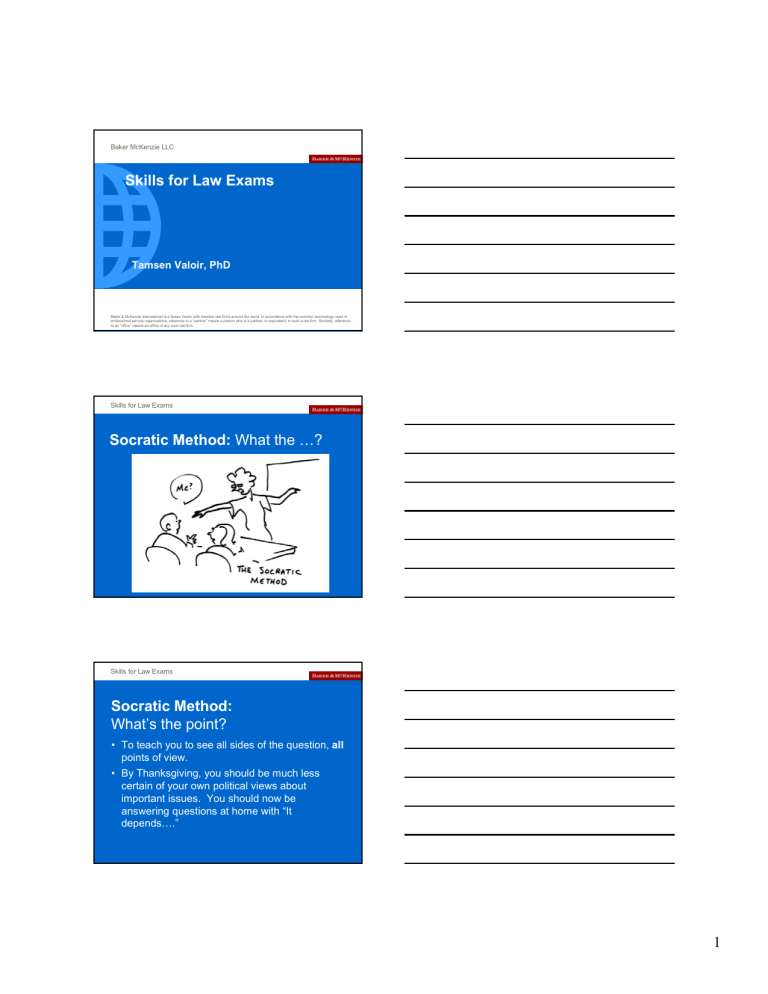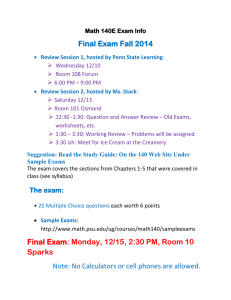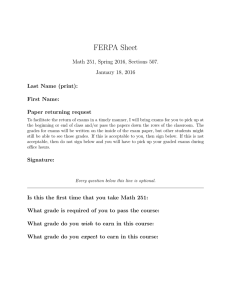Skills for Law Exams Tamsen Valoir, PhD Baker McKenzie LLC

Baker McKenzie LLC
Skills for Law Exams
Tamsen Valoir, PhD
Baker & McKenzie International is a Swiss Verein with member law firms around the world. In accordance with the common terminology used in professional service organizations, reference to a “partner” means a person who is a partner, or equivalent, in such a law firm. Similarly, reference to an “office” means an office of any such law firm.
Skills for Law Exams
Socratic Method: What the …?
Skills for Law Exams
Socratic Method:
What’s the point?
• To teach you to see all sides of the question, all points of view.
• By Thanksgiving, you should be much less certain of your own political views about important issues. You should now be answering questions at home with “It depends….”
1
Skills for Law Exams
Different Viewpoints:
Why does it matter?
• The primary role of a lawyer is to COUNSEL her client, a secondary role is to advocate for her client.
• Until you can see alternative viewpoints, you cannot fully COUNSEL your client.
Skills for Law Exams
Different Viewpoints:
Practice tip
• Study with people from very different backgrounds. Together discuss the policies behind the black letter law. Try to see their point of view.
• There should be a republican, a democrat and an immigrant in every group.
Skills for Law Exams
Different Viewpoints:
Practice tip
• If you cannot participate much in the way of group study, try to at least have a cup of coffee or beer with other students to discuss the policies at issue in your class and the relationship of policy to the black letter law.
• Study groups need not have members of equal aptitude. You teach best what you need to learn.
2
Skills for Law Exams
Counsel v. Advocate:
Relevance to Exams
• A common mistake in approach is to pick an answer and argue for it. On an exam, you must play the role of counselor , not advocate. Thus, you must address all possible answers.
Skills for Law Exams
Casebook:
What should you learn?
• Learn the ELEMENTS of each crime, tort, rule.
• For every rule, learn the EXCEPTION (or the defense or the old rule or the minority rule).
• Elements & Exceptions = Black Letter Law ~
“Rules”
Skills for Law Exams
Elements & Exceptions:
= Black Letter Law
• Most Professors let you figure out the elements on your own.
• It's while organizing the plethora of cases & details into elements & exceptions that you begin to learn and understand the law.
3
Skills for Law Exams
Elements & Exceptions: Caveat
• There is usually more than one way to organize the elements & exceptions . Use the organization that your Professor seems to use.
If the Professor doesn’t talk about elements, use the organization provided in the text.
Otherwise, use the organization used by the
Law-in-a-Flash cards.
Skills for Law Exams
Outlines:
What’s the point?
• An outline is a chance to condense the information provided in class/case book into a readable summary. It is used as a memory tool.
A single word should trigger a whole train of memories.
• It is also the same organization used in essay exam answers.
Skills for Law Exams
Outlines:
What’s the point?
• It’s not a teaching tool - its generally too brief.
BUT, the act of creating an outline will teach you the law.
4
Skills for Law Exams
Outlines:
What’s the point?
• If sufficiently condensed, it can be used to ensure that you consider every possible cause of action in a complex, lengthy fact pattern.
• I have written a list of each crime in the front of my BB to ensure that I systematically considered each.
Skills for Law Exams
Outlines : Tips
• Use the Table of Contents for headers.
• Break each tort or crime down into elements.
Look for repeating patterns.
• Include each exception.
• Read the Cf. cases, notice the reason those cases go the opposite way.
• Feel free to dupe & revise someone else’s outline.
Skills for Law Exams
Outlines : Tips
• Use exploded views. When fully exploded your outline explains the law (as much as you need).
One level up it provides headers, elements, case names and descriptions, one level down it only provides headers, elements and case names, etc.
5
Skills for Law Exams
Outlines : Tips
• You can do this with software tools, or by dupe
& revise by deleting info, or by having an extra copy with handwritten notes.
• The point is to get the outline down to a condensed summary that triggers a memory of all the understanding you have for each subject.
Skills for Law Exams
Intentional Torts: Example
• Intent
– specific intent or
– general intent + substantial certainty
• XCP: doctrine of transferred intent (fat b-t--)
– NOT XCP: good faith mistake, mental illness
Skills for Law Exams
Intentional Torts: Example
• Intentional torts (intent, action, injury)
– F - False Imprisonment
– A - Assault
– T - Trespass
– B - Battery
– I - IIMD
– T - Trespass to Chattel
– Ch - Conversion
• Privileges
6
Skills for Law Exams
Intentional Torts: Example
– F - False Imprisonment
• Intent: unlawfully confine
• Action: threat or use of force
• Injury: confinement
– XCP: unaware of confinement
Skills for Law Exams
The Essay Exam: How to...
• Read the question and highlite all important facts.
• Organize your answer the same as your outline.
• Use HEADERS for each tort, each element of the tort, and each exception .
• Don’t forget the defense or privileges and other types of exceptions .
Skills for Law Exams
The Essay Exam: How to...
• Begin by stating the black letter rule for each element of the tort.
• Then discuss the facts .
• Several elements will be uncontested. Write a single sentence showing how a particular fact proves that element. Each time you neglect this sentence, you lose a point.
7
Skills for Law Exams
The Essay Exam: How to...
• For the elements that are dubious, write 5 - 7 sentences showing how the facts could lead you to one conclusion or the other. Make comparisons to the cases you have studied.
• Beware of hidden assumptions
• Then, discuss each defense or privilege or exception in a similar way.
Skills for Law Exams
The Essay Exam: How to...
• At the end, state the competing policies at interest and why different policies produce different answers. Choose an answer and state why you picked one policy interest over the other. This should be a summary 5 - 7 sentence paragraph.
• Repeat above for each possible crime or tort.
Skills for Law Exams
The Essay Exam: How to...
• Professors most often complain that the student has not WORKED the FACTS sufficiently.
Usually, students only recite the law and then pick an answer: D guilty of A & B, but not FI.
• Don’t forget to discuss each fact and how it proves/disproves each element or exception .
8
Skills for Law Exams
The Essay Exam: How to...
• Eloquent writing is not required. Clear logical, easy to read writing is.
• He who writes fastest wins. Its OK to write in an outline sort of way, as long as you work the facts. Short, simple sentences!
Skills for Law Exams
The Essay Exam: How to...
• It is not necessary to give case names, but the
AmJur student probably did.
• You can also refer to cases by their facts.
“girlfriend fell through the glass coffee table case.” This is just as good, but takes longer to write.
• Weird facts can also be used to help you remember a case -- include the weird fact in your outline along with the case name.
Skills for Law Exams
The Essay Exam: How to...
• Don’t forget the exceptions to the majority rule.
Use the Cf. cites from the casebook and the facts that made that case go the opposite way.
• The student who learns the majority rule will get a B grade, but the AmJur student learned all the exceptions .
9
Skills for Law Exams
Practice Tips: Memorizing
• The more you memorize, the more tools you have to use in an exam. This isn’t to say you don’t have to understand the law, you do. But once you understand it, break it down into useful elements & exceptions and memorize
(learn) these basics.
• Use your outline as a memory tool.
Skills for Law Exams
Practice Tips: Memorizing
Skills for Law Exams
Practice Tips: Memorizing
• Your brain is like a computer in that different input means get stored in different locations.
The more ways used to input info, the more chances you have for output when you need it.
Thus, writing, typing, hearing, saying, coloring are different means of input.
10
Skills for Law Exams
Practice Tips: Memorizing
• Different people have different memory strengths. If your strength is auditory, record your outline, if visual, color it. Nonetheless, remember to use multiple means of input.
Skills for Law Exams
Practice Tips: Memorizing
• You best memorize by repetition at decreasing intervals. Read, say, color, or somehow review your outline one month in advance, then two weeks, then one week, then two days, then one day and the same morning (for example).
• This means, your outline should be as complete as possible in advance, but don’t despair.
Skills for Law Exams
Practice Tips: Memorizing
• You can use someone else’s outline as a starting point (see online sources or divide the class up in your study group).
• You must have an electronic copy though, so you can tailor it for your memory needs . It’s hard to remember someone else’s words.
Review group-made outlines together so that significance of the summary gets clear.
11
Skills for Law Exams
Practice Tips: Memorizing
• Remember, the outline is a law summary , not a law teaching tool. That’s why when you read outlines before you learn the law, you can’t understand them.
• Cf.
the detailed outline that’s so thick it does teach the law (but can’t be remembered).
Use this outline as a starting point, and condense as fits YOU .
Skills for Law Exams
Practice Tips: Instant Recall
• Practice reciting the elements & exceptions on demand—buzzing.
• This is best done with a buddy. You can even make a non-lawyer or spouse do this for you -but another student is best because they can catch the errors.
Skills for Law Exams
Practice Tips: Instant Recall
• Where you can’t recall each element & exception, color your outline in red. Buzz again.
• The next time you forget, box that portion of the outline; the next time, fill the box in yellow.
• Your study buddy will obviously focus on those aspects that you have trouble remembering.
12
Skills for Law Exams
Practice Materials:
• http://stu.findlaw.com/outlines/injury.html This web site has outlines and old exams, many with answers.
• Law-in-a-Flash - little yellow flash cards provide an excellent listing of the elements of each tort etc., and has many good memory aids. They are a good study game for group study.
• Practice makes perfect.
Skills for Law Exams
Practice: More tips
• Practice the elements & exceptions , and practice writing essays.
• Practice under “real” conditions. This will improve your recall about 5%.
• Once the outlines have been made: Study at the same schedule as your exams are given.
Ex. 3 hrs for tort, break, 3 hrs for crim. You needn’t “finish” each class, it’s better to stick to a schedule.
Skills for Law Exams
Practice: More tips
• Get a good answer to a medium length essay question together in your study group. Ask the
Prof to critique it. If there are too many planning to do this, and the Prof balks, use one or two samples for the whole class. Or do it for each other.
13
Skills for Law Exams
Civ. Pro.: A different beast
• Civ. Pro. is a little different from torts, crimes & contracts. It consists of a lot of different, arbitrary rules with no relation to each other.
This makes it harder to learn & memorize.
• It still can be organized according to the Table of Contents and elements & exceptions
(elements much longer)
Skills for Law Exams
Civ. Pro.: Authority
• Another aspect of Civ. Pro. is the idea of precedence. Different courts have different weights of authority - obviously higher courts have more authority. Understand how the courts are organized and pay attention to the posture of the case. This is true for all subjects, but it is typically only dealt with in Civ. Pro.
Skills for Law Exams
Civ. Pro.: Practice tip
• You will have at least one long fact pattern, essay question dealing with International Shoe and the Erie doctrine. Write a sample answer in advance and learn it. Don’t forget to fit the facts of the question into your standard answer.
14
Skills for Law Exams
Civ. Pro.: Practice tip
• The rest of the questions are typically short answer, rule regurgitation.
• To learn the rules, try recording yourself reading your outline. Listen to the outline while doing laundry & driving to school.
Skills for Law Exams
Summary:
• Learn to act as counsel.
• Organize the law into elements and exceptions
(a/k/a black letter law).
• Outline elements and exceptions and memorize as much as possible.
Skills for Law Exams
Summary:
• Organize your answer according to your outline.
• Use headers.
• First state the black letter law for each element
& exception.
15
Skills for Law Exams
Summary:
• Then work the facts for both sides. Work the facts even for those elements not at issue. Use every fact .
• At the end, discuss policy, state why one policy leads you to one answer, and another leads to another answer. Pick an answer at the end and say why you chose it.
• Repeat for each tort or crime.
• Write short, simple, easy to read sentences.
Skills for Law Exams
Summary:
• Modify what I’ve said to suit your own needs.
You know best what works for you.
Skills for Law Exams
Summary:
• Get a good night’s sleep.
• Get lots of exercise (this is a marathon, not a race, and the point is to finish).
• Don’t confuse hard work with hard thought.
• Tell yourself every day: “I CAN do this.”
• Be enthusiastic.
• Share.
16
Skills for Law Exams
Skills for Law Exams
Good luck!
17





